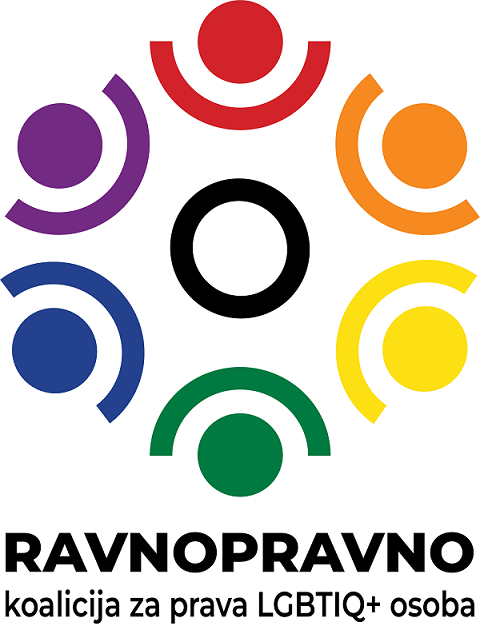The coalition of non-governmental organizations “Equality” expresses concern over the uncritical and unbalanced reporting by the public broadcaster RTCG on the Law on Legal gender recognition based on self-determination, whereby the RTCG violates Article 9 of the Law on Public Broadcasting services of Montenegro, which guarantees respect for professional standards. Inter alia, these standards include: strengthening social cohesion, reporting in balance manner, contributing to the respect and promotion of human rights, democratic values and institutions, promoting and supporting civil society values and presenting citizens’ initiative, informing the public on the events of public importance in the country and abroad in an impartial, truthful, timely, comprehensive manner, as well as reporting on actual life problems of different structures in Montenegrin society.
More precisely, the violation of professional standards began with the broadcast of the statement from the Metropolitanate of Montenegro and the Littoral (MCP) regarding the Draft Law on Legal gender recognition based on self-determination, in the news “Dnevnik,” broadcast on 11 March 2024, at 7:30 PM, by editor Jelena Otašević, after which it was also published on the RTCG portal. No one else was consulted as an interlocutor, which is why the Spektra Association submitted a complaint to the Ombudsperson of the RTCG, Danijela Popović, on 14 March 2024.
Furthermore, RTCG continued to violate professional standards in the TV show “Arguments” aired on 14 March 2024, on the topic “On coexistence in Montenegro and how religious communities contribute to peace and tolerance” where Joanikije, Metropolitan of Montenegro and the Littoral, Rifat Fejzić, the Grand Mufti of Montenegro, Rok Đonlešaj, the Archbishop of Bar, and Luciano Moše Prelević, the Chief Rabbi in Montenegro.
In this programme, the editor Ivana Popović posed a question about the Draft Law, incorrectly citing its title, with the following question: “Recently, there was a statement issued by Metropolitanate regarding this alleged Draft Law that appeared in the media, which would imply a possible change of gender and personal identification number. Why did you speak out first about this, and is it interference in state affairs?” With this unprofessional approach, the editor implied incorrect content and essence of the Draft Law, as it refers to the administrative change of gender marker and personal identification number, not to the issue of gender change, which has been regulated since 2012 by the Law on Health Insurance. Additionally, this opened up space to portray the views of religious communities as relevant in Montenegrin society regarding participation in the legislation on human rights, directly contravening the principle of a secular society. Furthermore, after the TV show, the RTCG portal published a summary of the programme under the title “Both the state and religious communities care about the same people,” further legitimizing the involvement of religious communities in state issues. In the reporting to the portal, the editor’s question was corrected, and the correct title of the Draft Law was used, thereby not accurately reflecting the course of the conversation. Within this publication, only one quote was visually highlighted, by Metropolitan Joanikije, who opposes the Draft Law: “Commenting on the Draft Law on Legal gender recognition based on self-determination, the Metropolitan stated that religions should be heard when passing laws to some extent encroach on religious feelings and heritage.” Additionally, the Metropolitan’s statement, based on misinformation and factually unfounded, was quoted: ‘Cases of gender change are quite rare, and we understand such people. But encouraging a person to such a unnatural dilemma is truly dangerous because it involves minors. It is known that those who change gender later have problems, they want to return to their original state, they experience incurable traumas, suicides occur… Don’t we have enough problems already or we want more? We must, for pastoral reasons, have a stance on this and it must be heard,’ he said for TVCG.
We call on the Ombudsman for Human Rights and Freedoms to initiate an investigation into discrimination and human rights violations, and Agency for Electronic Media to determine whether there has been a violation of the Law on National Public Broadcasting Radio-Television of Montenegro. We welcome the announcement by RTCG Council member Milica Špajak that she will address the issue raised before the RTCG Ombudsman regarding unbalanced reporting in the news “Dnevnik” and we call on her to do the same regarding the TV show “Arguments”.
We urge the public broadcaster to improve its editorial policy and make efforts to provide adequate media space which will enable respect for the principles of secularism and human rights in Montenegro, but also discussion that adequately inform citizens about the importance of adopting the Law on Legal gender recognition based on self-determination for the entire society and its contribution to the improvement of human rights, the rule of law and democracy in Montenegro.
Spektra Association
NGO Juventas
Montenegrin Women’s Lobby
NGO Link
Active zone
NGO Prima
Women’s Rights Center (WCR)
Association of LBTQ Women Stana
ANIMA
LGBTIQ Association Queer Montenegro
Centre for Civic Education (CCE)
CEDEM
CEMI
Human Rights Action

